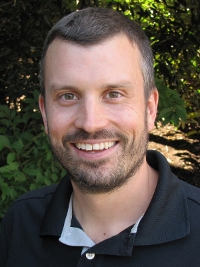I just took this dialect quiz that purports to tell “where in the continental United States do they speak like you?”
The quiz is based on the Harvard Dialect Survey and I was particularly interested in it because, as a military brat and military veteran, I grew up and lived all over the country and figured I might break the thing. (My father is from the Midwest and my mother is from western Pennsylvainia, so I expected I’d test for a standard Midwest dialect.)
For reference, here are all the places I’ve lived for more than a year and my approximate ages:
Colorado Springs, Colorado (0 – 3)
North Pole, Alaska (4-6)
Woodbridge, Virginia (7 – 10)
Flower Mound, Texas (11 – 13)
Amherst, New York (14 – 18)
Ithaca, New York (19 – 22)
Abilene, Texas (23 – 25)
North Pole, Alaska (26 – 28) – yes, again.
Davis, California (29 – 34)
Knoxville, Tennessee (34 – )
So did I break the thing? 140 questions later, here are my results:
The first thing to notice is that the map is not super informative (there appears to be a band of similarity going from Virginia, through the Midwest, to Texas).
The tables are more interesting. The numbers specify the probability that a randomly selected person from those cities would answer a randomly selected question the same way I would.
First, there does not seem to be a lot of variation in my scores and they all seem quite low to me (though I do not know if this is common). I also appear to not share a common dialect with New Englanders (which is probably very common).
But what is really interesting to me is my “most similar city,” Denton, Texas. It is interesting because Denton is only 15 miles away from Flower Mound, Texas, where I spent my middle school years (and is also, incidentally, the home town of
one of my favorite persons from grad school). The map below shows my middle school suspiciously close to Denton. (My middle school was, again incidentally, named after the
great-great grandfather of
another one of my favorite persons from grad school.)
Many of the people who read this blog have also heard me speak and have even likely had conversations with me. Do I sound like I’m from East Texas to you?
Granted, when I moved to New York my nick-name on the 9th-grade football team was “Tex” based largely on my accent. But by the next year, I lost (most of?) the drawl and that nick-name was forgotten (read: replaced by “Zim”).
But does some of that old middle-school dialect remain? Or is the above result just some sort of coincidence?
There seems to be some evidence for the former. According to this book, I lived near Denton during a key stage of peer-based dialect formation:
Labov (1970)* proposed that, up to the age of 5, children acquire the basic grammar and lexicon of their language, normally under the influence of parents. Between the ages of 5 and 12, children learn the dialect of their peer group… By the age of 14 or 15, adolescents start to move away from the peer group dialect and toward the more prestigious form of speech, especially in formal situations.
Might this peer group dialect still persist 21 years later to the extent it is detectable by the above dialect survey?
* – Labov, W. (1970) Stages in the acquisition of standard English. In R. Shuy (ed.), Social Dialects and Language Learning. Champaign, Ill.: National Council of Teachers of English.
UPDATE: I just want to point out that this “probability that you would answer a randomly selected question the same as someone from a randomly selected city” measure is likely not the best way to pinpoint someone’s area of origin. Some questions are more likely to provide more information to others, and some answers to those questions are likely to provide more information to than others. For example, one of the questions asked about the word used for a light-rail train. One of the possible answers was “BART.” BART stands for Bay Area Rapid Transit and I’m pretty sure someone using that as the generic word for light rail would likely have close ties to Northern California. But even if it is a crude measure, it at least seemed to preform well in my (anecdotal) case.


